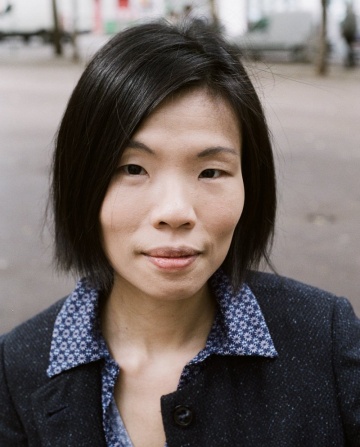Columbia College | Columbia University in the City of New York
Fiona Sze-Lorrain ’03 Recalls the “Imperfectly Perfect”

DOMINIQUE NABOKOV
What were you like when you arrived at Columbia?
I was 19 and knew nothing, really, about New York. I was happy, brave, eclectic and ready for any adventure or mischief. I was curious about Columbia and the city, and of course, America. I flew in from Singapore; before that I had spent some time in Canada. I arrived with a giant black suitcase.
Family friends from Queens accompanied me to Morningside Heights and helped me settle in. They worried that I would not eat enough once I was left to my own devices, so they made absolutely sure, before leaving, that I memorized the directions to on-campus eateries. But I quickly became addicted to the eel sushi rolls from Lerner Hall, having tasted them for lunch upon arrival. I was so eager to “test out” the sushis with my prepaid meal points on my brand-new student card. I remember thinking how lucky I was. I was nervous, but I wasn’t frightened.
During the first two months, I was still hand-writing my essays. Some of my classmates looked at me as if I was an alien. A floormate from California, younger but smarter than I, taught me how to format and type my papers in Microsoft Word. I still write longhand.
What do you remember about your first-year living situation?
I was assigned a double in John Jay. Right on the top, the 14th floor (I hope I have the number right!) at the far corner, down the corridor from the elevator. The room was more spacious than the others, and I relished looking out my window at Low Library. I recall having arrived a few days earlier than most students, and how I prized the experience of the entire floor all to myself.
My roommate hailed from the Midwest. She had a strong character and was highly accomplished. I had never shared a room, and knew few Americans before meeting her, but to my astonishment we got along. Much more disciplined than I, she sailed and played violin and as far as I knew, excelled in every class. I slept by 10 p.m. and experimented with facial products. I have fond memories of some of my floormates: One practiced cello in his room, one was a good-natured Asian-American engineer who interned at a firm and bore my CD music, another was a Russian science genius. After our first year, we lived in different buildings and I neither saw them often nor knew them well, but they struck me as sweet, kind souls.
The elevators in John Jay were impossible; I gave up on them after Orientation. I took the stairs every day and dreaded bumping into people who dashed up with heads bowed, while I sort of stumbled down each flight. There were accidents, both nasty and pleasant.
What Core class or experience do you most remember, and why?
My first semester of Literature Humanities. Bettina Brandt was my teacher; she was Dutch, and such a delightful presence — approachable and laid-back, yet precise and organized. I read the Greek tragedies with enthusiasm, and looked forward to her lessons. It was an early-morning class; I took driving lessons at 8 a.m. at a nearby driving school before rushing to show up on time for her class. What was I thinking?
Contemporary Civilization classes were a challenge. It was around then that I started to take a serious interest in politics, activism and our messy world.
Did you have a favorite spot on campus, and what did you like about it?
Does The Hungarian Pastry Shop count? It was one of my favorite haunts. I befriended a film studies student whom I could speak French with, and in my sophomore year, a Japanese graduate student who looked way younger than her age; she became one of my close friends. I would hang out with either of them at the cafe during the weekends. Sometimes we went for Shanghainese food for lunch at Columbia Cottage before heading to the pastry shop. There, we would occupy a table and read — if all went well — for the rest of the afternoon. Many times I wished for evening live music — it would then have been even more cramped. I imagined myself meeting Kafka-like characters in the spooky, dim space.
The Butler Library and the Starr East Asian Library were favorites, too. I can’t imagine why someone wouldn’t wish to read there, or be part of those beautiful spaces.
What, if anything, about your College experience would you do over?
It all seems far behind me now. I would have liked to learn more about Spanish and German literature. I wish I played more bridge with friends. I wish I took dance classes. I would gladly read Shakespeare over and again. I wish I studied with Donald Keene ’42, GSAS’50 and Wm. Theodore de Bary ’41, GSAS’53, whom I met on an airplane. I took a course in aerobics instruction, but dropped out. I would have loved to work harder in calculus and audit some not-too-challenging science classes.
In hindsight, my first year was the most bracing. Obviously, I didn’t feel that way then. A year later, I spent a summer at Reid Hall, where I studied Baudelaire and Maupassant and visited monuments for a French history class. Alas, the roses in Reid Hall are now gone. It was an age of innocence. Imperfectly perfect. I wish ... but couldn’t wish for more.
More “Take Five”
- 1 of 32
- ›

